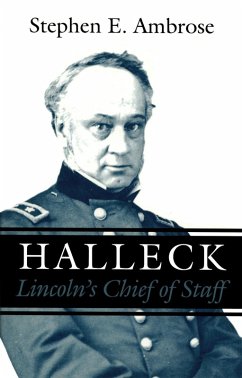"Halleck originates nothing, anticipates nothing, to assist others; takes no responsibility, plans nothing, suggests nothing, is good for nothing." Lincoln's secretary of the navy Gideon Welles's harsh words embody the stereotype into which Union General-in-Chief Henry Wager Halleck has been cast by most historians since Appomattox. In Halleck: Lincoln's Chief of Staff, originally published in 1962, Stephen Ambrose challenges the standard interpretation of this controversial figure.
Ambrose argues persuasively that Halleck has been greatly underrated as a war theorist because of past writers' failure to do justice to his close involvement with movements basic to the development of the American military establishment. He concedes that "by all the touchstones used to judge great captains of the past, Halleck was a failure," but maintains he was nonetheless "the 'Old Brains' of the Union Army in the time of the testing of the nation."
Ambrose argues persuasively that Halleck has been greatly underrated as a war theorist because of past writers' failure to do justice to his close involvement with movements basic to the development of the American military establishment. He concedes that "by all the touchstones used to judge great captains of the past, Halleck was a failure," but maintains he was nonetheless "the 'Old Brains' of the Union Army in the time of the testing of the nation."
Dieser Download kann aus rechtlichen Gründen nur mit Rechnungsadresse in A, D ausgeliefert werden.









